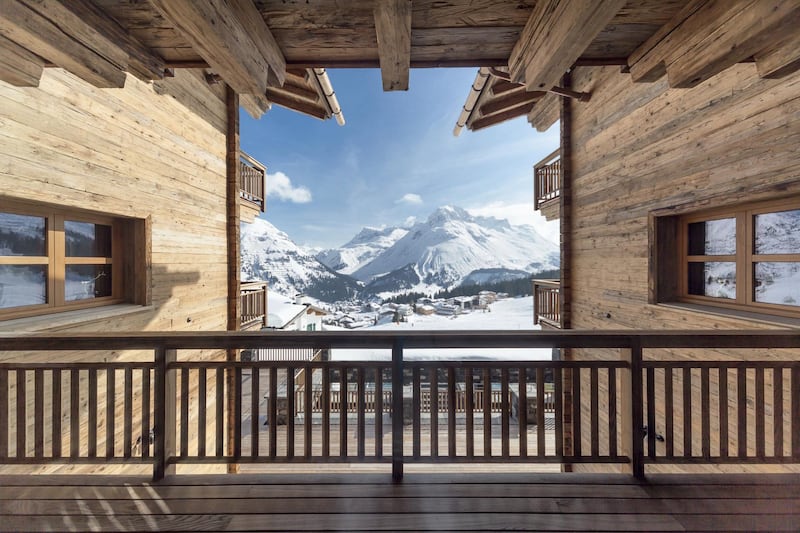It's 7am on a bright spring morning in the second week of April; after an overnight flight, a new Range Rover Evoque with tinted windows and laden with bottles of Fiji mineral water is a suitable transfer vehicle.
Yet the 200km drive from Zurich Airport to the village of Oberlech in the western Austrian province of Vorarlberg is smooth and somewhat surreal: for much of the two-hour journey, there’s no snow. Sparse green meadows lie at the foot of grey, barren mountains; cows are grazing and hikers are out as the sun beats down.
But Oberlech, rather like the chalet I’m heading toward, is something of a fantasy. At an elevation of 1,750 metres, it’s 300 metres higher than the already elite Lech, a favourite of oligarchs and the British, Jordanian and Monaco royal families among others, but which, in the dying days of the ski season, is looking distinctly threadbare outside the main runs. Here, in Oberlech, winter is back.
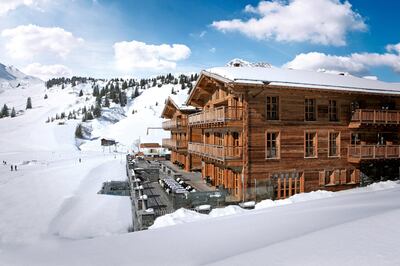
Arriving at Chalet N, which at an average of €290,000 (Dh1.2 million) per week is the world’s most expensive ski chalet, is unsensational at first. Like many buildings here, where development is strictly controlled, the double-fronted, three-storey building is all regional stone and timber on the outside. Inside, it’s like arriving at a Swedish house party – albeit with a dash of blackened steel, leather, velvet and more stone. Twentysomething staff, all distinguished in their black polo-necks, welcome me like I own the place; the slick-but-homely interiors actually make me feel like I do.
My second-floor suite, one of seven including a top-floor master suite, has a large balcony overlooking the valley. Some sedate skiers drift past on the quiet slopes below; the jagged heights of the mountains separating this state from neighbouring Tyrol are front and centre.
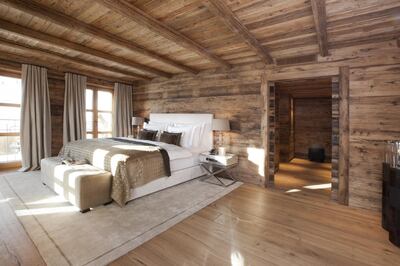
Double-glazed, bulletproof windows keep things quiet and secure – not that there’s any noise to be bothered by. My living area has a dining space with fresh orchids, a huge stock of complimentary drinks and mountains of chocolate truffles. A designer fireplace and solid-wood floors, walls and ceilings are balanced nicely by luxurious fittings and furnishings, including gossamer-soft, faux-fur throws, bespoke lighting, a state-of-the-art sound system, silver sculptures and Toto toilets with electronic heated seats, a fast-filling bath and deep stocks of Bulgari products.
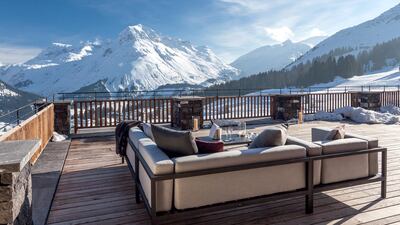
Downstairs in the lounge, the coffee and sandwich that I’d bought at Zurich airport prove unnecessary. After checking out the enormous outdoor terrace, breakfast is served: just for starters, there are four types of mountain cheeses, mostly French, and Austrian cold meat; freshly pressed orange juice, home-baked bread rolls, crepes and cappuccinos. An Italian staff member insists I try the freshly cut Colombian mango (“it has very good vitamins”) and looks happy when I do. This chalet can accommodate a maximum of 22 people, and the rate, which rises to a high of €490,000 (Dh2.1m) a week at Christmas, includes three multi-course meals a day and one massage per person, per week, in the cave-like spa, which is an aesthetic wonderland in the basement. Beautifully lit pools, waterbeds, a hay sauna and scented steam room, a colour therapy shower with circular Swarovski crystal curtains, plus an outdoor Jacuzzi overlooking the ski slopes, are all on offer, as well as a gym.
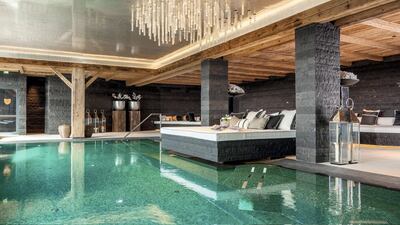
After a quick trip into Lech to rent my ski gear – from Strolz, the best company in town – I reflect on my previous time spent skiing in Austria, in nearby St Anton, a beautiful but high-adrenaline place with ferociously hard skiing. There, my accommodation had been a dorm-style room with friends and a boot room that smelled, well, bad. The boot room in the basement at Chalet N is so clean, dry and fresh you can shuffle down there (in the private lift) in your slippers. Next door to it is a cinema and private dining room. Before any skiing, though, it’s time for lunch.
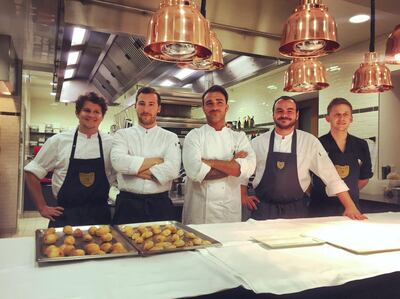
Aware of their guests desire for food that is both decadent and not too heavy, there is an emphasis on quality ingredients served in smallish portions, enabling us to have it all: monkfish with lentils, chickpeas and caviar, seabass gnocchi with zucchini, a fish soup with vegetables and a caramel parfait with a milk coffee foam.
As other members of our group arrive during the afternoon, we decide on a luxury normally unthought of on a ski trip – today, we just won’t bother skiing. Instead, I explore the little car-free village around the chalet, take walks across snow-capped fields and marvel at the beauty of the occasional stark piece of agricultural architecture. EU funded or not, farmers and animals live well here, with new machinery, indoor-outdoor yards and storage areas, and a tiny, well-heeled local population with a very select choice of rustic-looking restaurants.
Chalet N is one of a handful of new luxury ski chalets and hotels in the high-end Austrian resorts of Lech, Oberlech, St Anton, Stuben and Zurs, all now connected by a lift system, which saw several new additions this year, including the Flexenbahn cable car, linking Zurs with Stuben, and the Bergbahn cable car, from Lech to Oberlech. Lech is in the middle and most suitable for intermediate skiers who appreciate tranquil Alpine environments as opposed to large resorts. Chalet N, which cost about US$53 million (Dh194.7m) to construct and opened in 2012, is owned by 40-year-old Austrian Rene Benko, a property investor and founder of Signa Holding, a real-estate company specialising in upscale acquisitions including the Goldenes Quartier in Vienna: tenants include Louis Vuitton, Prada and Armani, banks and high-street brands; many other developments are ongoing. Clients of the chalet, named after the first initial of his wife and four children, include Benko and other wealthy individuals (many making use of a nearby helipad and private airport) or less wealthy groups (divided, the rate drops to about €4,000 [Dh17,119] per room, per night). Though you don’t see them, there are about 100 security cameras in and outside the chalet.
After a dinner that included veal-stuffed tortellini with polenta and shiitake mushrooms, halibut with mint cream, Wagyu beef and an elaborate sponge cake with lychee cucumber granite, it’s time for an early night. Though comfortable, the bedroom is too warm and I have to leave the windows open.
The next day, I have the pleasure of a few hours with Hannes, a private ski instructor from Zurs. There are 375km of slopes immediately available; Oberlech’s top lift takes us to 2,811 metres, but there are dozens of combinations from Lech, about five minutes away downhill. While my ski tuition to date has been a confusing mix of French and Austrian techniques, Hannes reminds me that I’m in the home of the famous “Arlberg turn” and therefore should be skiing mainly from the legs, bending into the slope from the hip, rather than employing the (in my case) emergency French-style upper-body turns to get out of trouble. Because of the season and lack of fresh snow, the freshly groomed pistes are icy first thing and slushy at the end of the morning. Hannes is a great, patient, funny teacher and the landscapes do not disappoint either.
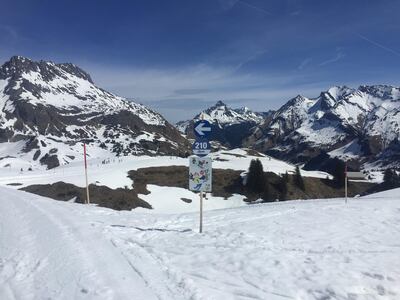
Then it is back to the chalet for a lunch of cheese dumpling soup, chicken galantine with roast potatoes and tirimisu, followed by an afternoon at the spa and an evening in Lech, a pleasant town dating back to 1300. Back then, the community began cutting down trees for farming, unwittingly making space for the town’s future ski runs. Now with a permanent population of about 1,600, Lech has attractive shopping and a river running through it. Dinner is at the historic Hus Nr 8 in town, a historic, traditional restaurant with a cosy atmosphere and deliciously heavy menu featuring fondue, raclette, beef soup and Wiener schnitzel and chocolate cake. Thankfully, the Range Rovers are on hand to haul us back up the hill afterwards.
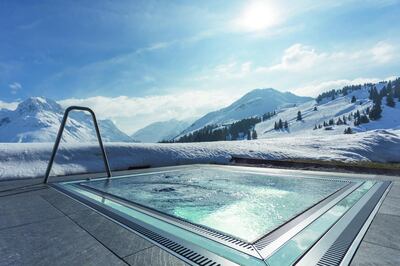
Hannes is at breakfast the following morning to take me out on to the slopes one last time. “The weather is perfect”, he says, and I can’t disagree – though I do let him carry my skis to the slope. When I set off back to Zurich a couple of hours later, the sun is still shining.
_______________
Read more:
[ All glass: see the light in Finnish Lapland ]
[ Five new ski hotels in Europe ]
[ A winter break in Pyeongchang, South Korea ]
_______________
